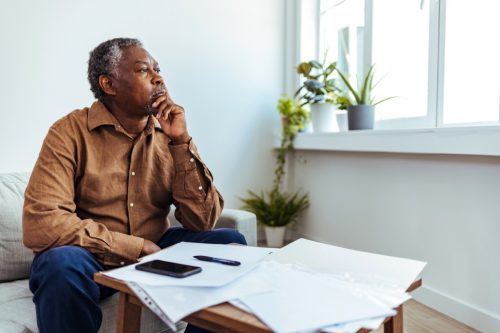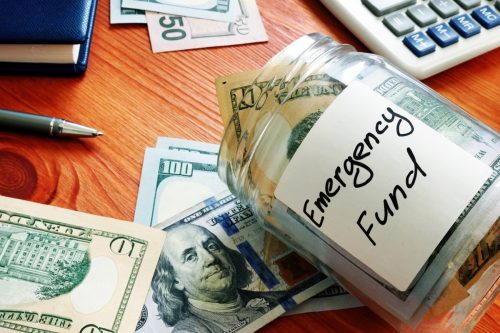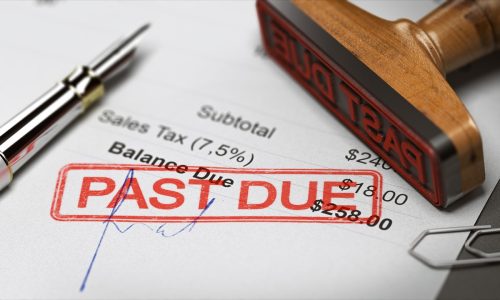9 Major Signs You're Not Ready to Retire, Financial Experts Say
It's better to wait than to retire too early and pay the consequences.

Whether you're nearing retirement age or just dreaming about the day you'll finally be able to enjoy your leisure time, most of us are more than ready to stop working every day. But this isn't a transition you should make without ample preparation. Retirement requires substantial planning, beyond just considering what vacations you'll want to take and which hobbies you'll pick up with all your new free time. Most importantly, you need to be able to financially support a lifestyle where you are not actively earning a substantial income. To make sure you're not going into things unprepared, we talked to financial experts to gather insight on the red flags you need to know. Read on to discover nine major signs you're not ready to retire just yet.
RELATED: 5 Biggest Retirement Regrets Everyone Experiences.
1
You have no plan for healthcare costs.

As you get older, your health often needs more management. You may be taking more medications than you once did, or going to the doctor more regularly. If you haven't already made a plan for how you're going to cover your healthcare costs going forward, you're not ready for retirement yet, according to Dana Ronald, CEO of Tax Crisis Institute.
"Medical expenses are often one of the most prominent expenses retirees face, and having a plan to cover those costs is essential," she says.
RELATED: 25 Best Ways to Save for Retirement.
2
You have a high debt-to-income ratio.

Don't disregard your debts if you're thinking about retiring, either.
"High debt levels can be difficult to manage in retirement," Ronald warns. If you currently have a high debt-to-income ratio, she says you should wait to retire.
Courtney Alev, consumer financial advocate at Credit Karma, recommends paying attention to your credit card debt and student loans—especially given that federal student loan payments return next month.
"Having these outstanding payments—which may be growing in size, if they are accruing interest—can make it difficult to save enough for retirement," she says.
To avoid letting these debts continue to pile up, Alev advises older adults to create a detailed plan on how they can pay down what they owe.
"You need to make realistic adjustments to your budget to allow room for any outstanding debt payments, to avoid going into default and/or accruing additional interest or fees," she shares.
RELATED: 8 Affirmations to Feel Ridiculously Happy Every Day in Retirement.
3
You don't have an emergency fund.

You should be saving money outside of your retirement fund, according to Ronald. If you don't currently have an emergency fund, it might not be a good idea for you to retire just yet.
"Having cash available for unexpected expenses is essential to avoid taking away from long-term savings or increasing debt levels," Ronald says.
If you want to save up quickly so you can retire soon, money-saving expert Andrea Woroch suggests picking up a side hustle in your spare time.
"There are plenty of flexible options out there right now," Woroch says. "For instance, you can find freelance work through sites like UpWork or FlexJobs and make up to an extra $1,000 a month watching someone's pet in your home through Rover.com."
4
You are already struggling to pay your existing bills.

It's important to be financially stable before you retire, according to Alev.
"If you are currently struggling financially, retirement should not be in the near future," she says. As Woroch further explains, this means you shouldn't be living paycheck to paycheck, or have trouble paying your current bills.
"During your retirement years, you will likely be living on a lower monthly income," Woroch cautions. "And although some expenses may drop naturally during retirement—such as dry cleaning and commuting costs—others may increase, such as traveling more or fees to enjoy various hobbies."
RELATED: 6 Mindfulness Tips to Feel Amazing Every Day in Retirement.
5
You are not willing to downsize your lifestyle.

Lowering your cost of living is often a crucial step to take prior to retiring. Andrew Lokenauth, financial expert and founder of BeFluentInFinance, says you have to be willing to downsize your lifestyle somewhat if you want to retire.
"This could mean downsizing your home, driving a less expensive car, or cooking at home more often," Lokenauth explains.
Carter Seuthe, CEO of Credit Summit Debt Consolidation, says you shouldn't retire yet if you're still living in a home that's too large for your needs.
"I have experienced this with my own parents, who lived in a home with several extra bedrooms and lots of extra space as they prepared for retirement," Seuthe tells Best Life. "Not only can this become a hassle to maintain as you age, but the mortgage and maintenance costs proved too high for their retirement income. Their budget was much easier to manage once they had downsized into a smaller home."
RELATED: 6 Signs It's Time to Downsize Your Home, Experts Say.
6
You don't have a retirement budget.

While you may pick up more expenses through the years, it's still important to have an idea of what you'll be spending after you retire. That means retirement shouldn't be on the table yet if you haven't created a budget for your future, according to Raymond Quisumbing, MBA, registered financial planner at BizReport.
"Now would be a good time to start projecting a realistic budget to ensure that your retirement fund can handle all your expenses," he advises.
7
You are financially responsible for supporting other people.

You're not the only person you need to consider when thinking about retiring, especially if there are others dependent on your right now.
"If you are financially supporting other people in your life, such as your children or an elderly relative, it may not be the best time to retire," Alev says.
She recommends exploring how to help your dependents become financially independent so you can reach your retirement desires.
"Sit down with them and create a budget with a strict timeline to show where your support will start to pull back, in order to allow you to move forward with your goals to retire," Alev suggests.
RELATED: 10 Easy Ways to Save on a Fixed Income.
8
You have no clear income strategy.

Having a retirement fund and other emergency funds are a good starting point. But Quisumbing says you shouldn't retire if you haven't also created a clear income strategy.
"Do you have a plan on how to earn extra income after you retire? There is a good chance that you will need to earn money on the side so that your retirement fund does not get depleted faster than you expect," he shares.
9
You haven't talked to a financial planner.

Even if you think you have all your finances together, it is still essential to talk to a professional before you retire.
"If you haven't sat down with a financial planner or financial therapist, you're missing out on valuable insights that could shape your retirement journey," Khwan Hathai, a certified financial planner at Epiphany Financial Therapy, says. "These professionals can offer both a financial snapshot and deep insights into your emotional readiness for retirement."
For more financial advice delivered straight to your inbox, sign up for our daily newsletter.
Best Life offers the most up-to-date financial information from top experts and the latest news and research, but our content is not meant to be a substitute for professional guidance. When it comes to the money you're spending, saving, or investing, always consult your financial advisor directly.





















